Inline functions
Inline functions
Inline functions overview
Tray's inline functions feature allows you to perform data transformations directly on data that is being pulled into your workflow steps. This can bring extra functionality, flexibility and efficiency to your workflows. One of the main benefits is that it can simplify tasks which would normally require multiple core / helper steps in combination with booleans and branches, thus leading to overly-complex workflows.
Note that all functions are currently returned stringified, and so in the examples provided below you would need to check for a string of "true" rather than an actual boolean.
Creating inline functions
Inline functions can be used both as single function calls, and as combined function calls which mix multiple functions.
- A function call must use the format of
functionName(parameter1, parameter2) - The parameters of each function are contained within
( ) - Parameters can be hardcoded or can use jsonpaths to reference both data from previous steps via
$.steps.and project config variables via$.config. - Functions can contain 1 or more parameters
A single function call would look something like:
formatDate("04/09/2023", "yyyy-MM-dd")This could be used to e.g. format a date directly in the relevant properties panel field when using the date filter option in an operation such as Salesforce's 'Find records':
Please see the Setting defaults via config section below for guidance on standardized use of timezones and date formats
Combining multiple Inline Functions
For powerful functionality and flexibility, it is possible to chain combine function calls in a single expression.
A chained function call would look something like:
isBefore(addMonths($.steps.object-helpers-1.result.registered_date, 6), addDays(now("UTC", "yyyy-MM-dd"), 21))
This chained function combines multiple date functions and returns true or false, so could be used directly in a boolean step:
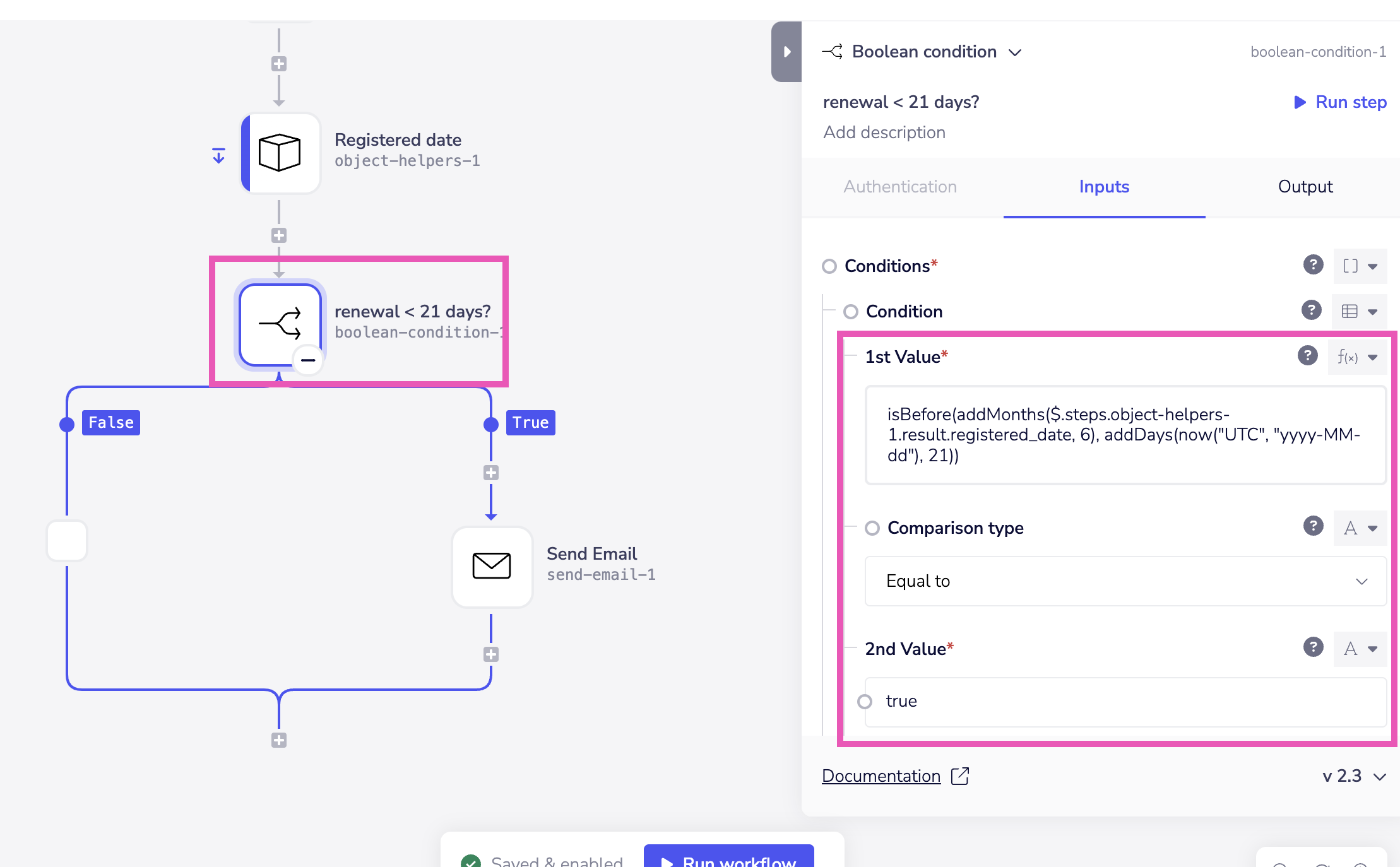 A chained date function call like this would negate the need for multiple use of the date / time helpers connector:
A chained date function call like this would negate the need for multiple use of the date / time helpers connector:
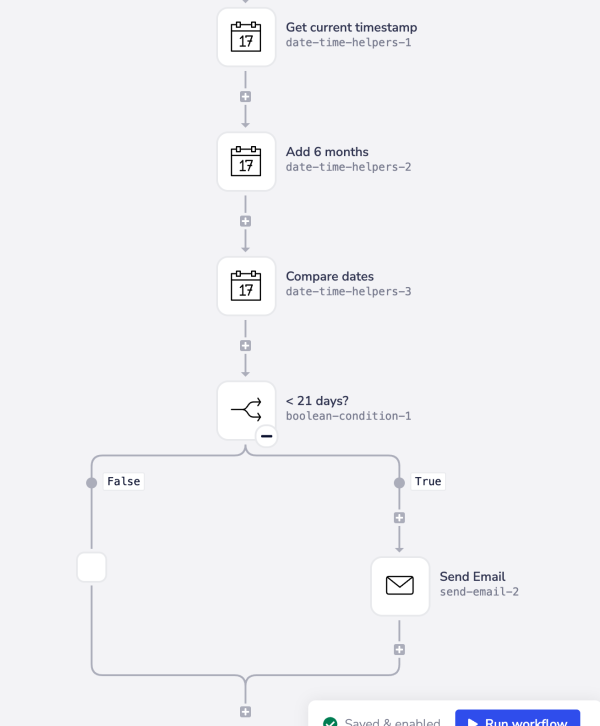
The inline functions editor
To use inline functions for any string-based field in the connector properties panel, select the function input type from the drop-down:
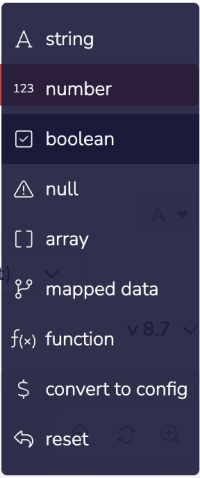 Then when using the editor you can use
Then when using the editor you can use = to search for functions by name and description
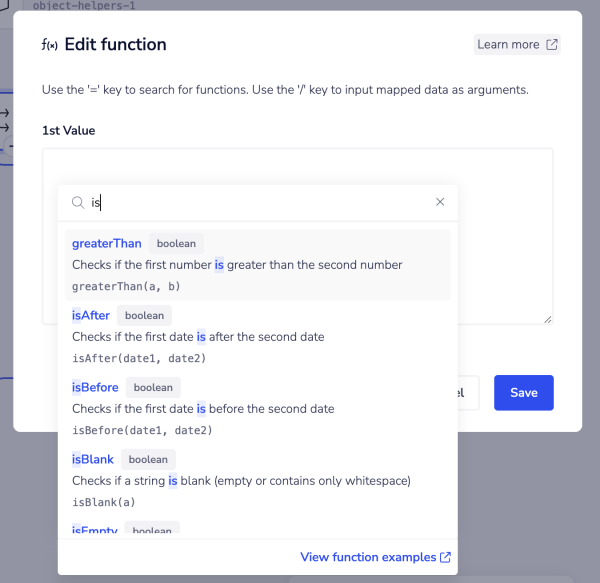 And you can use
And you can use / to search for mapped data (via jsonpaths) from previous workflow steps ($.steps.) and project config ($.config.) to add as dynamic arguments:
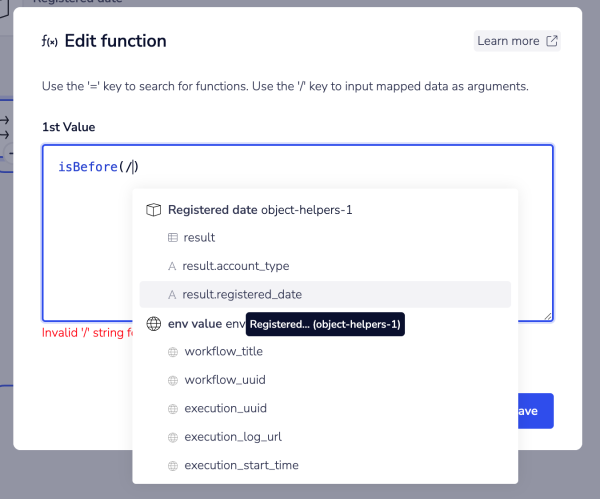
Setting defaults via config (for date formatting etc.)
To standardize how you work with dates (and avoid having to repeatedly enter formatting parameters), you can make use of project config to set your timezone and also to set the formats that are required to work with particular services. For example you could set the following project config to work with Salesforce:
date_format=yyyy-MM-dddate_time_format=yyyy-MM-dd'T'HH:mm:ssZtimezone=PST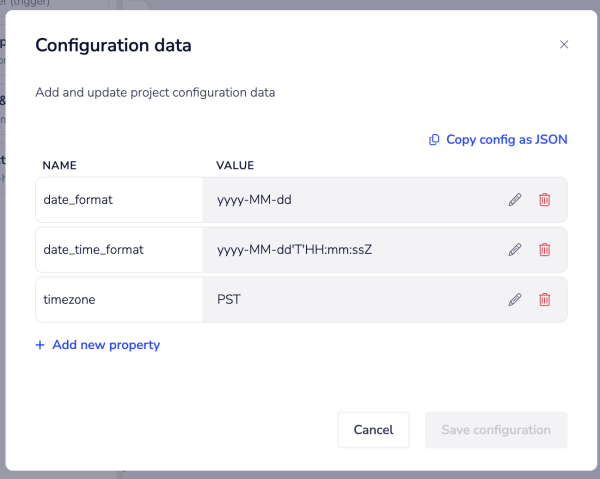 This allows us to flexibly adapt to the Valid Date and DateTime Formats of Salesforce whereby some endpoints require date in Date format and some require it in DateTime format.
The project config can then be used in a function such as
This allows us to flexibly adapt to the Valid Date and DateTime Formats of Salesforce whereby some endpoints require date in Date format and some require it in DateTime format.
The project config can then be used in a function such as formatDate($.steps.object-helpers-1.result.launch_date, $.config.date_format)when making calls to the service: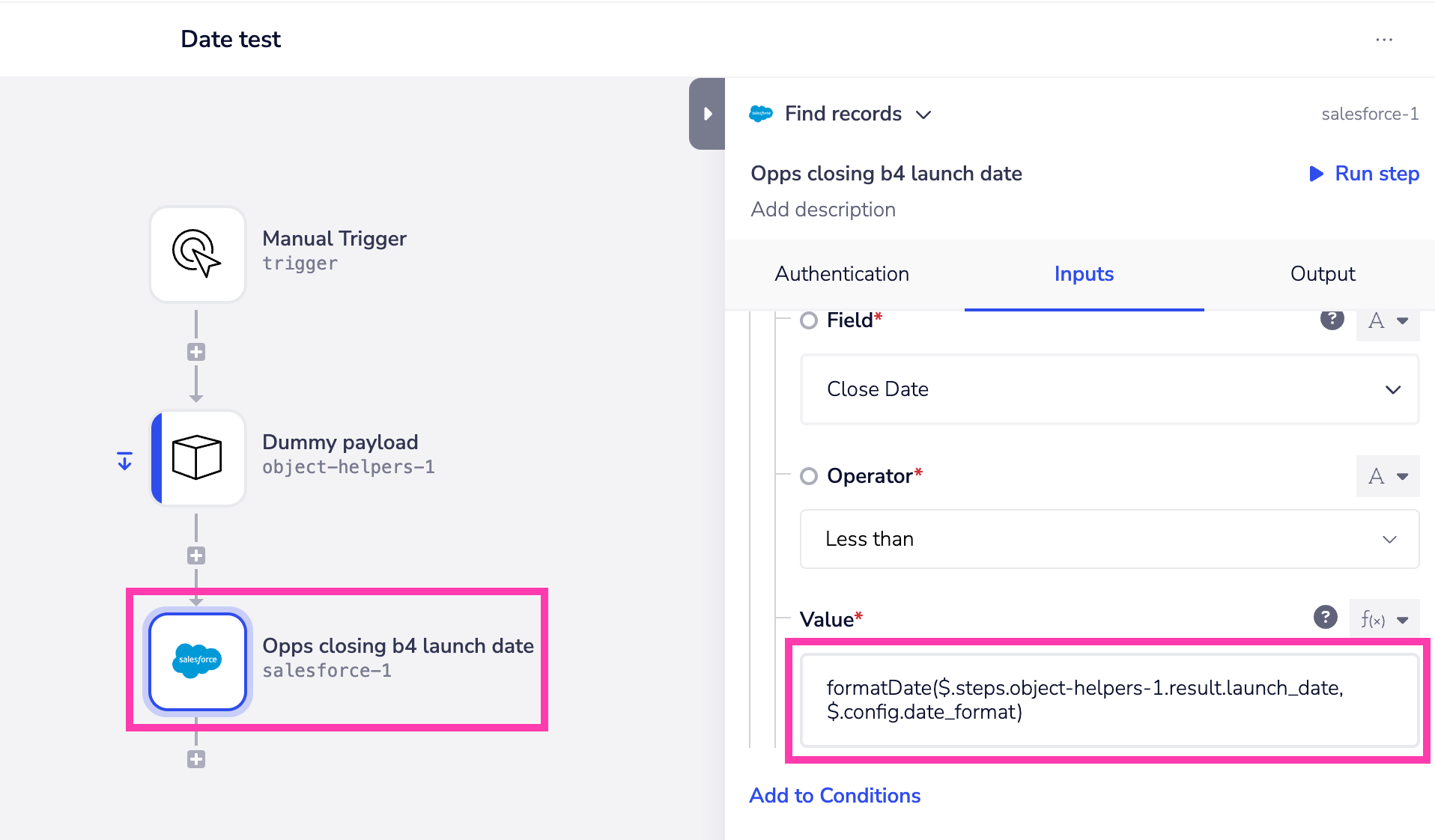 You could also use project config to build your own standarized 'TODAY' function whereby using a timezone and date format (i.e. not date/time) as parameters for the 'now' function will return today's date:
You could also use project config to build your own standarized 'TODAY' function whereby using a timezone and date format (i.e. not date/time) as parameters for the 'now' function will return today's date:
now($.config.timezone, $.config.date_format)
Getting Merlin search to build functions
Merlin search (the docs knowledge agent) can be used to build complex combined functions for you.
You can ask questions in the following manner:
Using tray's inline functions feature *only* (stringFunctions, numberFunctions and booleanFunctions) how could I create a URL slug from a title by replacing spaces and underscores with hyphens and converting it to lowercase?
Merlin should then return a function which you can directly copy and paste into the inline functions editor:
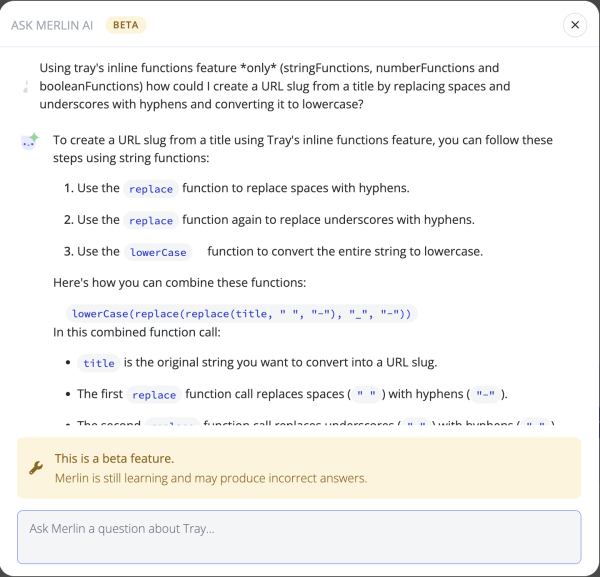 You may need to subsequently edit for correct jsonpath etc.
You may need to subsequently edit for correct jsonpath etc.
stringFunctions
addBusinessDays
Adds a specified number of business days to a date
| Example inputs | Example outputs |
|---|---|
addBusinessDays("2024-01-01T00:00:00", 1) | "2024-01-02T00:00:00+0000" |
addBusinessDays("2024-01-01T00:00:00", 5) | "2024-01-08T00:00:00+0000" |
addDays
Adds a specified number of days to a date
| Example inputs | Example outputs |
|---|---|
addDays("2024-01-01T00:00:00", 10) | "2024-01-11T00:00:00+0000" |
addHours
Adds a specified number of hours to a date
| Example inputs | Example outputs |
|---|---|
addHours("2024-01-01T00:00:00", 1) | "2024-01-01T01:00:00+0000" |
addMinutes
Adds a specified number of minutes to a date
| Example inputs | Example outputs |
|---|---|
addMinutes("2024-01-01T00:00:00", 1) | "2024-01-01T00:01:00+0000" |
addMonths
Adds a specified number of months to a date
| Example inputs | Example outputs |
|---|---|
addMonths("2024-01-01T00:00:00", 2) | "2024-03-01T00:00:00+0000" |
addSeconds
Adds a specified number of seconds to a date
| Example inputs | Example outputs |
|---|---|
addSeconds("2024-01-01T00:00:00", 1) | "2024-01-01T00:00:01+0000" |
addWeeks
Adds a specified number of weeks to a date
| Example inputs | Example outputs |
|---|---|
addWeeks("2024-01-01T00:00:00", 2) | "2024-01-15T00:00:00+0000" |
addYears
Adds a specified number of years to a date
| Example inputs | Example outputs |
|---|---|
addYears("2024-01-01T00:00:00", 2) | "2026-01-01T00:00:00+0000 |
camelCase
Converts a string to camelCase
| Example inputs | Example outputs |
|---|---|
camelCase("hello world") | "helloWorld" |
camelCase("foo_bar") | "fooBar" |
concat
Concatenates two strings
| Example inputs | Example outputs |
|---|---|
concat("Hello, ", "world!") | "Hello, world!" |
concat("foo", "bar") | "foobar" |
formatDate
Formats a date string according to the specified format. The input date must be valid according to the isValidDate function Valid patterns can be constructed using the following symbols:
- YY - short year: 24
- YYYY - long year: 2024
- Q - quarter: 1
- M - month: 5
- MM - month: 05
- MMM - month: Feb
- MMMM - month: February
- W - week of the year: 6
- WW - week of the year: 06
- D - day of month: 6
- DD - day of month: 06
- DDD - day of year: 39
- DDDD - day of year: 039
- d - day of the week: 1
- dd - day of the week: Mon
- ddd - day of the week: Mon
- dddd - day of the week: Monday
- a - am/pm: am
- H - hour (0-23): 1
- HH - hour (0-23): 01
- h - hour (1-12): 1
- hh - hour (1-12): 01
- k - hour (1-24): 1
- kk - hour (1-24): 01
- m - minute: 2
- mm - minute: 02
- s - second: 3
- ss - second: 03
- S - millisecond: 4
- SS - millisecond: 40
- SSS - millisecond: 400
- Z - zone offset: +00:00
- ZZ - zone offset: +0000
- T - The character T
- 'string' - '' can be used to introduce any string in the formatted value
As an alternative to composing a format with the above some special formats can be specified:
- salesforce_date_time - this is the date time format used by Salesforce
- salesforce_date - this is the date format used by Salesforce
| Example inputs | Example outputs |
| --- | --- |
|
formatDate("2024-05-16", "DD/MM/YYYY")|"16/05/2024"| |formatDate("2024-05-16T12:30:00", "YYYY-MM-DD HH:mm")|"2024-05-16 12:30"|
if
Returns one of two values based on a condition
| Example inputs | Example outputs |
|---|---|
if(true, "yes", "no") | "yes" |
if(false, "yes", "no") | "no" |
if(null, "yes", "no") | "no" |
kebabCase
Converts a string to kebab-case
| Example inputs | Example outputs |
|---|---|
kebabCase("hello world") | "hello-world" |
kebabCase("fooBar") | "foo-bar" |
lowerCase
Converts a string to lowercase
| Example inputs | Example outputs |
|---|---|
lowerCase("HELLO") | "hello" |
lowerCase("Test") | "test" |
now
Returns the current date and time formatted according to the specified format and time zone Valid patterns can be constructed using the following symbols:
- YY - short year: 24
- YYYY - long year: 2024
- Q - quarter: 1
- M - month: 5
- MM - month: 05
- MMM - month: Feb
- MMMM - month: February
- W - week of the year: 6
- WW - week of the year: 06
- D - day of month: 6
- DD - day of month: 06
- DDD - day of year: 39
- DDDD - day of year: 039
- d - day of the week: 1
- dd - day of the week: Mon
- ddd - day of the week: Mon
- dddd - day of the week: Monday
- a - am/pm: am
- H - hour (0-23): 1
- HH - hour (0-23): 01
- h - hour (1-12): 1
- hh - hour (1-12): 01
- k - hour (1-24): 1
- kk - hour (1-24): 01
- m - minute: 2
- mm - minute: 02
- s - second: 3
- ss - second: 03
- S - millisecond: 4
- SS - millisecond: 40
- SSS - millisecond: 400
- Z - zone offset: +00:00
- ZZ - zone offset: +0000
- T - The character T
- 'string' - '' can be used to introduce any string in the formatted value
As an alternative to composing a format with the above some special formats can be specified:
- salesforce_date_time - this is the date time format used by Salesforce
- salesforce_date - this is the date format used by Salesforce
| Example inputs | Example outputs |
| --- | --- |
|
now("UTC", "YYYY-MM-DD HH:mm:ss")|"2024-05-16 12:30:45"| |now("Europe/London", "DD/MM/YYYY HH:mm")|"16/05/2024 13:30"|
parseDate
Parses a date according to the specified format and returns it formatted using the default format YYYY-MM-DDTHH:mm:ss.SSSZZ (Missing info will be filled with defaults) Valid patterns can be constructed using the following symbols:
- YY - short year: 24
- YYYY - long year: 2024
- Q - quarter: 1
- M - month: 5
- MM - month: 05
- MMM - month: Feb
- MMMM - month: February
- W - week of the year: 6
- WW - week of the year: 06
- D - day of month: 6
- DD - day of month: 06
- DDD - day of year: 39
- DDDD - day of year: 039
- d - day of the week: 1
- dd - day of the week: Mon
- ddd - day of the week: Mon
- dddd - day of the week: Monday
- a - am/pm: am
- H - hour (0-23): 1
- HH - hour (0-23): 01
- h - hour (1-12): 1
- hh - hour (1-12): 01
- k - hour (1-24): 1
- kk - hour (1-24): 01
- m - minute: 2
- mm - minute: 02
- s - second: 3
- ss - second: 03
- S - millisecond: 4
- SS - millisecond: 40
- SSS - millisecond: 400
- Z - zone offset: +00:00
- ZZ - zone offset: +0000
- T - The character T
- 'string' - '' can be used to introduce any string in the formatted value
As an alternative to composing a format with the above some special formats can be specified:
- salesforce_date_time - this is the date time format used by Salesforce
- salesforce_date - this is the date format used by Salesforce
| Example inputs | Example outputs |
| --- | --- |
|
parseDate("07-22-23", "MM-DD-YY")|"2023-07-22 00:00"|
pascalCase
Converts a string to PascalCase (upperCamelCase, studlyCase)
| Example inputs | Example outputs |
|---|---|
pascalCase("hello world") | "HelloWorld" |
pascalCase("foo_bar") | "FooBar" |
removeSpecialCharacters
Removes special characters from a string, keeping only letters and digits
| Example inputs | Example outputs |
|---|---|
removeSpecialCharacters("hello@world!") | "helloworld" |
removeSpecialCharacters("foo_bar123") | "foobar123" |
replace
Replaces occurrences of a substring with another string
| Example inputs | Example outputs |
|---|---|
replace("hello world", "world", "scala") | "hello scala" |
replace("abcabc", "a", "x") | "xbcxbc" |
snakeCase
Converts a string to snake_case
| Example inputs | Example outputs |
|---|---|
snakeCase("hello world") | "hello_world" |
snakeCase("fooBar") | "foo_bar" |
substring
Extracts a substring from a string
| Example inputs | Example outputs |
|---|---|
substring("hello", 0, 2) | "he" |
substring("world", 1, 4) | "orl" |
subtractBusinessDays
Subtracts a specified number of business days from a date
| Example inputs | Example outputs |
|---|---|
subtractBusinessDays("2024-01-01T00:00:00", 1) | "2023-12-31T00:00:00+0000" |
subtractBusinessDays("2024-01-01T00:00:00", 5) | "2023-12-25T00:00:00+0000" |
subtractDays
Subtracts a specified number of days from a date
| Example inputs | Example outputs |
|---|---|
subtractDays("2024-01-01T00:00:00", 10) | "2023-12-22T00:00:00+0000" |
subtractHours
Subtracts a specified number of hours from a date
| Example inputs | Example outputs |
|---|---|
subtractHours("2024-01-01T00:00:00", 1) | "2023-12-31T23:00:00+0000" |
subtractMinutes
Subtracts a specified number of minutes from a date
| Example inputs | Example outputs |
|---|---|
subtractMinutes("2024-01-01T00:00:00", 1) | "2023-12-31T23:59:00+0000" |
subtractMonths
Subtracts a specified number of months to a date
| Example inputs | Example outputs |
|---|---|
subtractMonths("2024-01-01T00:00:00", 2) | "2023-11-01T00:00:00+0000" |
subtractSeconds
Subtracts a specified number of seconds from a date
| Example inputs | Example outputs |
|---|---|
subtractSeconds("2024-01-01T00:00:00", 1) | "2023-12-31T23:59:59+0000" |
subtractWeeks
Subtracts a specified number of weeks from a date
| Example inputs | Example outputs |
|---|---|
subtractWeeks("2024-01-01T00:00:00", 2) | "2023-12-18T00:00:00+0000" |
subtractYears
Subtracts a specified number of years to a date
| Example inputs | Example outputs |
|---|---|
subtractYears("2024-01-01T00:00:00", 2) | "2022-01-01T00:00:00+0000 |
toString
Converts a value into a string
| Example inputs | Example outputs |
|---|---|
toString(1) | "1" |
toString(true) | "true" |
trim
Trims whitespace from both ends of a string
| Example inputs | Example outputs |
|---|---|
trim(" hello ") | "hello" |
trim("test") | "test" |
upperCase
Converts a string to UPPERCASE
| Example inputs | Example outputs |
|---|---|
upperCase("hello") | "HELLO" |
upperCase("Test") | "TEST" |
numberFunctions
abs
Returns the absolute value of a number
| Example inputs | Example outputs |
|---|---|
abs(-5) | 5 |
abs(5) | 5 |
add
Adds two numbers (sum)
| Example inputs | Example outputs |
|---|---|
add(1, 2) | 3 |
add(3.5, 2.5) | 6 |
ceil
Returns the smallest integer greater than or equal to a number
| Example inputs | Example outputs |
|---|---|
ceil(4.2) | 5 |
ceil(-4.8) | -4 |
divide
Divides the first number by the second number
| Example inputs | Example outputs |
|---|---|
divide(6, 2) | 3 |
divide(7, 2) | 3.5 |
floor
Returns the largest integer less than or equal to a number
| Example inputs | Example outputs |
|---|---|
floor(4.8) | 4 |
floor(-4.2) | -5 |
if
Returns one of two values based on a condition
| Example inputs | Example outputs |
|---|---|
if(true, 1, 2) | 1 |
if(false, 1, 2) | 2 |
indexOf
Finds the index of a substring in a string
| Example inputs | Example outputs |
|---|---|
indexOf("hello", "ell") | 1 |
indexOf("world", "ell") | -1 |
length
Calculates the length of a string (size)
| Example inputs | Example outputs |
|---|---|
length("Hello") | 5 |
length("") | 0 |
log
Returns the natural logarithm (base e) of a number
| Example inputs | Example outputs |
|---|---|
log(1) | 0 |
log(2) | 0.6931471805599453 |
log10
Returns the base 10 logarithm of a number
| Example inputs | Example outputs |
|---|---|
log10(1) | 0 |
log10(10) | 1 |
mod
Calculates the remainder of the division of two numbers
| Example inputs | Example outputs |
|---|---|
mod(5, 2) | 1 |
mod(6, 3) | 0 |
multiply
Multiplies two numbers (product, times)
| Example inputs | Example outputs |
|---|---|
multiply(2, 3) | 6 |
multiply(3.5, 2) | 7 |
pow
Raises a number to the power of another number
| Example inputs | Example outputs |
|---|---|
pow(2, 3) | 8 |
pow(4, 0.5) | 2 |
round
Rounds a number to the nearest integer
| Example inputs | Example outputs |
|---|---|
round(4.5) | 5 |
round(4.4) | 4 |
sqrt
Returns the square root of a number
| Example inputs | Example outputs |
|---|---|
sqrt(4) | 2 |
sqrt(9) | 3 |
subtract
Subtracts the second number from the first number (minus, difference)
| Example inputs | Example outputs |
|---|---|
subtract(5, 3) | 2 |
subtract(3.5, 2.5) | 1 |
timestampInMilliseconds
Returns the current timestamp in milliseconds since the epoch
| Example inputs | Example outputs |
|---|---|
timestampInMilliseconds() | 1621265400123 |
timestampInSeconds
Returns the current timestamp in seconds since the epoch
| Example inputs | Example outputs |
|---|---|
timestampInSeconds() | 1621265400 |
toNumber
Converts a string to a number
| Example inputs | Example outputs |
|---|---|
toNumber("123") | 123 |
toNumber("45.67") | 45.67 |
booleanFunctions
and
Performs logical AND operation on two boolean values
| Example inputs | Example outputs |
|---|---|
and(true, false) | false |
and(true, true) | true |
contains
Checks if a string contains another string
| Example inputs | Example outputs |
|---|---|
contains("hello", "ell") | true |
contains("world", "ell") | false |
endsWith
Checks if a string ends with another string
| Example inputs | Example outputs |
|---|---|
endsWith("hello", "lo") | true |
endsWith("world", "lo") | false |
eq
Checks if two values are equal (equals)
| Example inputs | Example outputs |
|---|---|
eq(1, 1) | true |
eq(1, 2) | false |
eq("aa", "aa") | true |
eq("aa", "a") | false |
eq(false, false) | true |
eq(true, false) | false |
eq(0, false) | false |
greaterThan
Checks if the first number is greater than the second number
| Example inputs | Example outputs |
|---|---|
greaterThan(5, 3) | true |
greaterThan(3, 5) | false |
greaterThan(5, 5) | false |
if
Returns one of two values based on a condition
| Example inputs | Example outputs |
|---|---|
if(true, true, false) | true |
if(false, true, false) | false |
isAfter
Checks if the first date is after the second date
| Example inputs | Example outputs |
|---|---|
isAfter("2024-05-16", "2024-05-17") | false |
isAfter("2024-05-17", "2024-05-16") | true |
isBefore
Checks if the first date is before the second date
| Example inputs | Example outputs |
|---|---|
isBefore("2024-05-16", "2024-05-17") | true |
isBefore("2024-05-16", "2024-05-16") | false |
isBlank
Checks if a string is blank (empty or contains only whitespace)
| Example inputs | Example outputs |
|---|---|
isBlank("hello") | false |
isBlank(" ") | true |
isBlank("") | true |
isEmpty
Checks if a string is empty
| Example inputs | Example outputs |
|---|---|
isEmpty("hello") | false |
isEmpty(" ") | false |
isEmpty("") | true |
isValidDate
Checks if a string is a valid date according to the accepted formats. A valid date can be used on all the functions accepting a date as parameter. The following is a list of examples of valid dates; other formats can be supported via the parseDate function:
- "2024-01-22T23:04:05.000+0000"
- "2024-01-22T23:04:05.000Z"
- "2024-01-22T23:04:05.000+00:00"
- "2024-01-22T23:04:05.000"
- "2024-01-22T23:04:05+0000"
- "2024-01-22T23:04:05Z"
- "2024-01-22T23:04:05+00:00"
- "2024-01-22T23:04:05"
- "2024-01-22 23:04:05.000 +0000"
- "2024-01-22 23:04:05.000 Z"
- "2024-01-22 23:04:05.000 +00:00"
- "2024-01-22 23:04:05.000"
- "2024-01-22 23:04:05 +0000"
- "2024-01-22 23:04:05 Z"
- "2024-01-22 23:04:05 +00:00"
- "2024-01-22 23:04:05"
- "2024-01-22 23:04"
- "2024-01-22"
- "22-01-2024"
- "22/01/2024"
- "22/01/24"
- "01-22-2024"
- "01/22/2024"
- "01/22/06"
| Example inputs | Example outputs |
| --- | --- |
|
isValidDate("2024-05-16")|true| |isValidDate("invalid-date")|false|
not
Performs logical NOT operation on a boolean value
| Example inputs | Example outputs |
|---|---|
not(true) | false |
not(false) | true |
or
Performs logical OR operation on two boolean values
| Example inputs | Example outputs |
|---|---|
or(true, false) | true |
or(false, false) | false |
propertyExists
Checks if a property exists
| Example inputs | Example outputs |
|---|---|
propertyExists($.steps.step-1.field) | true |
smallerThan
Checks if the first number is smaller than the second number
| Example inputs | Example outputs |
|---|---|
smallerThan(3, 5) | true |
smallerThan(5, 3) | false |
smallerThan(3, 3) | false |
startsWith
Checks if a string starts with another string
| Example inputs | Example outputs |
|---|---|
startsWith("hello", "he") | true |
startsWith("world", "he") | false |
toBoolean
Converts a string to a boolean value
| Example inputs | Example outputs |
|---|---|
toBoolean("true") | true |
toBoolean("false") | false |